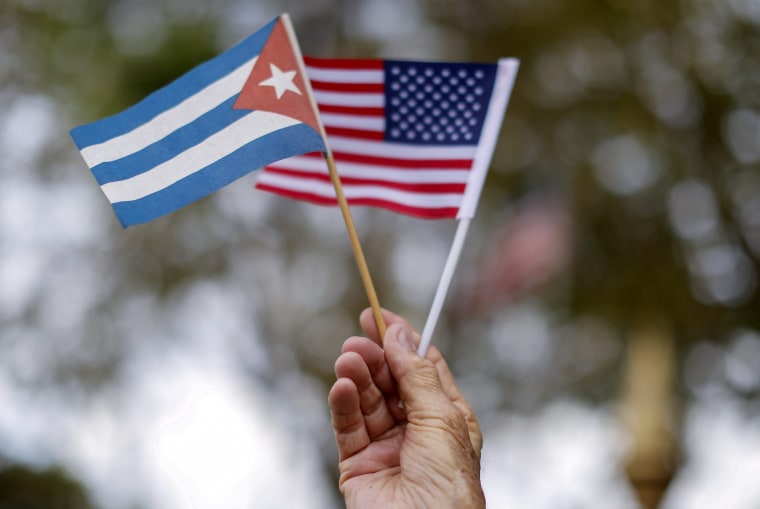MIAMI, Fla. -- Miami Beach Mayor Philip Levine wants to extend a welcome to a Cuban Consulate in his city after meeting with government officials in Havana on Wednesday.
But the welcoming does not come without controversy. The idea of a Cuban consulate in the neighboring city of Miami has stirred emotions in the Cuban exile community since the U.S. and Cuba announced they would reestablish diplomatic relations.
Miami Mayor Tomás Regalado, whose journalist father spent over 20 years in prison under the Castro regime, swiftly rejected hosting a Cuban government facility in his city since December 17, 2014 – the day diplomatic relations were announced.
Those who oppose a potential consulate in Miami think it would become a flashpoint for protests each time Cuba upsets the exile community.
Regalado said “it would be a challenge for Miami Beach which holds a lot of events,” while dealing with protesters regularly outside the consulate.
“This is an unfunded mandate,” Regalado told NBC News, “and we have to take the brunt of the expenses.” Whichever city is chosen has to pay the expenses of protecting protesters, diplomats, and those seeking consular services. Regalado said Miami had a similar situation when it housed the Venezuelan consulate and the city had to pay police officers’ overtime hours to protect the area.
“I think it’s a bad idea. I think it creates problems more than bring revenues to the city,” he said.

Regalado reiterated Wednesday he would sue in federal court to keep Cuba from opening a consulate within Miami city limits – something he has stated in the past.
Cuba’s embassy reopened in Washington DC, in July and the next logical step is to open a consular office in a city with a large immigrant community. Miami holds the country’s largest Cuban population, so some feel it would make sense for the city to house the diplomatic offices in order take care of the needs that arise with increased travel and immigration.
"It belongs in Miami-Dade County," said Miami commissioner Ricky Arriola to the Miami Herald. "It needs to go where they're going to serve the greatest number of its people," said Arriola, who supports the idea .
Related Article: Miami's Original Cuban Consulate Coming Back to Life
But in January, Miami-Dade County commissioners passed a resolution to urge the federal government to refrain from allowing a Cuban consulate in Miami-Dade county, saying it could “inflame passions and create security risks.” Miami Beach is part of Miami-Dade County.
Levine told the Miami Herald in an interview Wednesday in Havana that “they [the Cuban government] brought it up to us.” Tampa, which was being considered as an option outside Miami-Dade County, is too far away.
Levine, who owns real estate property in Miami Beach, was on a trip to Cuba he sponsored for Tufts University graduate students. The dates of the trip coincided with Barack Obama’s visit to the island.
Ultimately, the decision of where to open a consulate is not up to local governments and nothing is expected to be decided in the near future.

